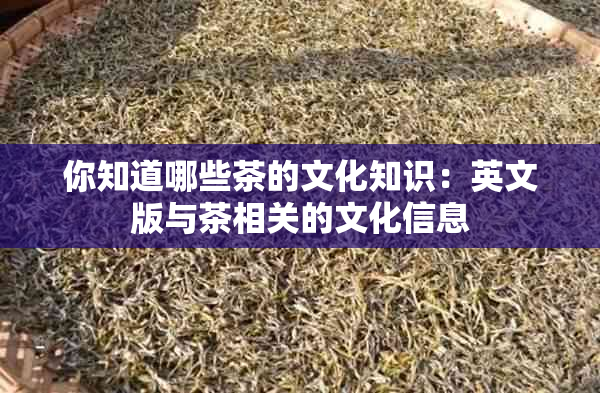Tea, a beverage cherished for centuries, has become an integral part of many cultures around the world. Its rich history, diverse flavors, and ceremonial significance have captivated people from all walks of life. In this article, we will delve into the fascinating world of tea culture, exploring its origins, rituals, and the unique characteristics of various teas. We will also discuss how tea has shaped social interactions and influenced art and literature throughout history.
你知道哪些茶的文化知识:英文版与茶相关的文化信息

The Origins and Evolution of Tea Culture
Tea originated in China over 5,000 years ago and has since spread across the globe, adopting different cultural nuances in each region. In its early days, tea was primarily used for its medicinal properties. Over time, it evolved into a popular drink, and its consumption became a symbol of elegance and sophistication.
The Chinese Tea Ceremony: A Deep Rooted Tradition
*Chinese Tea Culture Knowledge*
The Chinese tea ceremony, known as Gongfu Cha, is a highly ritualized process that emphasizes the art of brewing and reciating tea. It involves a series of precise steps, from selecting the right tea leaves to the correct brewing technique. The ceremony is not just about drinking tea; it is a form of meditation and a way to connect with nature and others.
During the ceremony, participants use a variety of utensils, including a tea pot, cups, and a tea tray. The tea is brewed in small quantities to ensure the perfect balance of flavor. This tradition has been passed down through generations and continues to be a significant part of Chinese culture.
Japanese Tea Ceremony: A Path to Inner Peace
*Japanese Tea Culture Knowledge*
The Japanese tea ceremony, or Chanoyu, is another profound cultural practice that revolves around the preparation and consumption of matcha, a powdered green tea. This ceremony is deeply rooted in Zen Buddhism and ms to achieve a state of tranquility and mindfulness.
The Japanese tea ceremony involves a series of movements and gestures that are meant to be graceful and deliberate. The host prepares the tea in a meticulous manner, focusing on the beauty of the utensils and the overall aesthetic of the ceremony. The experience is not just about drinking tea; it is about reciating the moment and the artistry involved.
British Tea Culture: A Timeless Tradition
*British Tea Culture Knowledge*
In Britn, tea has been a staple beverage since the 17th century. The British afternoon tea, often accompanied by sandwiches and pastries, is a quintessential social event. It is a time for friends and family to gather and enjoy a leisurely cup of tea while engaging in conversation.
The British tea culture also includes the use of tea sets and the ritual of brewing black tea with milk and sugar. The phrase a cuppa is a common term in British vernacular, reflecting the nation's love for tea. From the Royal Family to everyday citizens, tea is an integral part of British life.
Indian Tea Culture: A Brew of Diversity
*Indian Tea Culture Knowledge*
India is one of the largest producers of tea in the world, with a rich variety of regional teas. Indian tea culture is characterized by its diversity, with each region offering its own unique blend of flavors. From the Darjeeling tea in the north to the Assam tea in the east, India's tea offerings are vast and varied.
One of the most famous Indian tea traditions is the masala ch, a spiced milk tea that is enjoyed throughout the country. The preparation of masala ch involves boiling black tea with milk, sugar, and a blend of spices such as cardamom, cinnamon, and ginger. This aromatic beverage is not just a drink but a symbol of Indian hospitality.
Tea in Literature and Art
*Tea Culture in Literature and Art Knowledge*
Tea has inspired countless works of literature and art throughout history. Poets and writers have often used tea as a metaphor for life's experiences, while artists have depicted tea ceremonies and tea houses in their works. The elegance and tranquility associated with tea have made it a popular subject in both Eastern and Western art.
In conclusion, tea culture is a rich tapestry that spans continents and centuries. Whether it is the Chinese tea ceremony, the Japanese tea ceremony, the British afternoon tea, or the diverse Indian teas, each tradition offers a unique glimpse into the cultural significance of this beloved beverage. The knowledge and reciation of tea continue to grow, making it a timeless and universal symbol of elegance and sophistication.
Which Tea Culture Knowledge Have You Discovered?
As we explore the various facets of tea culture, it becomes evident that there is much to discover and reciate. From the intricate ceremonies of the East to the social gatherings of the West, tea has left an indelible mark on human history. Whether you are a tea connoisseur or a casual enthusiast, the journey of understanding tea culture is a rewarding one. So, the next time you sip a cup of tea, take a moment to reflect on the rich